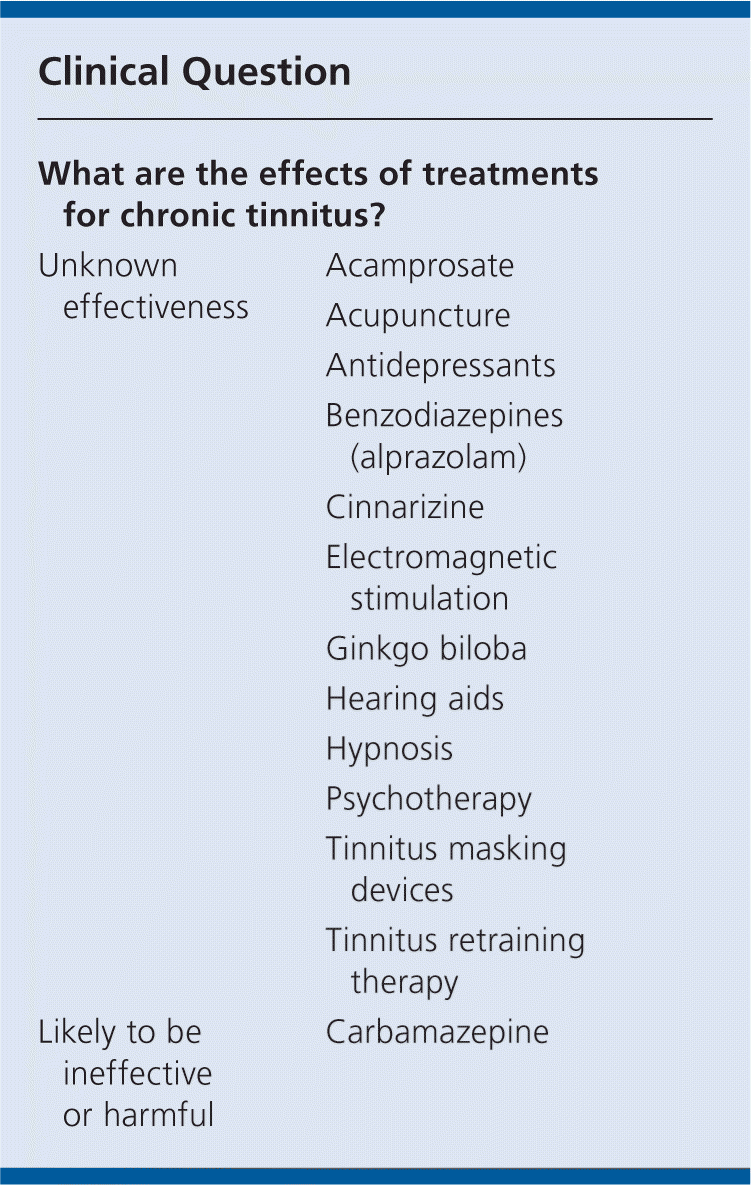
Am Fam Physician. 2014;89(6):471-472
Author disclosure: Julian Savage and Angus Waddell declare that they have no competing interests.
Up to 18% of persons in industrialized societies are mildly affected by chronic tinnitus, and 0.5% report tinnitus having a severe effect on their daily life.
Tinnitus can be associated with hearing loss, acoustic neuromas, drug toxicity, ear diseases, or depression.
Tinnitus can last for many years and can interfere with sleep and concentration.
There is insufficient evidence to show that antidepressants improve tinnitus symptoms.
Antidepressants can improve depression in persons with tinnitus.
Tricyclic antidepressants are associated with adverse effects, such as dry mouth, blurred vision, and constipation.
Cognitive behavior therapy may be ineffective at reducing tinnitus loudness, but it may improve quality of life in persons with tinnitus.
We do not know whether benzodiazepines, acupuncture, hypnosis, electromagnetic stimulation, hearing aids, tinnitus masking devices, tinnitus retraining therapy, cinnarizine, Ginkgo biloba, or acamprosate are effective in persons with tinnitus, because we found few studies.
Carbamazepine may be no more effective than placebo at improving symptoms of tinnitus and is associated with adverse effects, such as dizziness, nausea, and headache.

| What are the effects of treatments for chronic tinnitus? | |
| Unknown effectiveness | Acamprosate |
| Acupuncture | |
| Antidepressants | |
| Benzodiazepines (alprazolam) | |
| Cinnarizine | |
| Electromagnetic stimulation | |
| Ginkgo biloba | |
| Hearing aids | |
| Hypnosis | |
| Psychotherapy | |
| Tinnitus masking devices | |
| Tinnitus retraining therapy | |
| Likely to be ineffective or harmful | Carbamazepine |
Definition
Tinnitus is the perception of sound in the ear or head that does not arise from the external environment, from within the body (e.g., vascular sounds), or from auditory hallucinations related to mental illness. This review is concerned with tinnitus for which tinnitus is the only, or the predominant, symptom in an affected person.
Incidence and Prevalence
Up to 18% of the general population in industrialized countries are mildly affected by chronic tinnitus, and 0.5% report tinnitus having a severe effect on their ability to lead a normal life.
Etiology and Risk Factors
Tinnitus can occur as an isolated idiopathic symptom or in association with any type of hearing loss. Tinnitus can be a particular feature of presbycusis (age-related hearing loss), noise-induced hearing loss, Meniere disease, or the presence of an acoustic neuroma. In persons with toxicity from aspirin or quinine use, tinnitus can occur with hearing thresholds remaining normal. Tinnitus is also associated with depression, although it can be unclear whether the tinnitus is a manifestation of the depressive illness or a factor contributing to its development. Studies involving persons with tinnitus caused by Meniere disease, acoustic neuroma, chronic otitis media, head injury, barotraumas, or other clear pathology have been excluded from this review. This review is principally concerned with idiopathic tinnitus with or without degenerative sensorineural hearing loss.
Prognosis
Tinnitus can have an insidious onset, with a long delay before clinical presentation. It can persist for many years or decades, particularly when associated with sensorineural hearing loss. Tinnitus can cause disruption of sleep patterns, an inability to concentrate, and depression.
EDITOR'S NOTE: Cinnarizine is not available in the United States.
